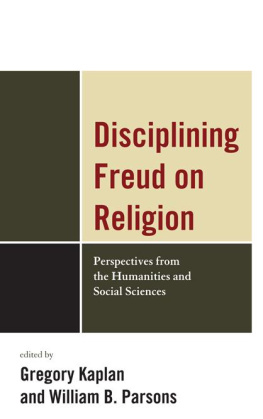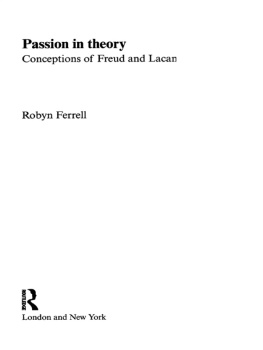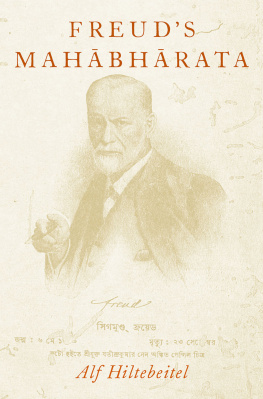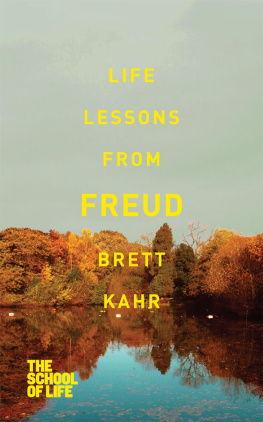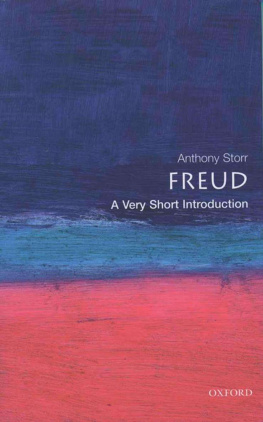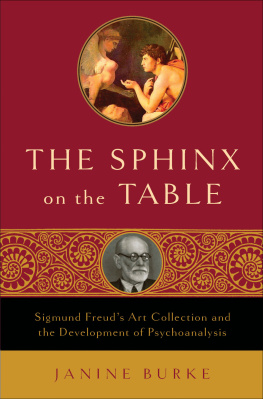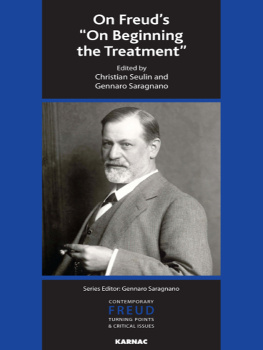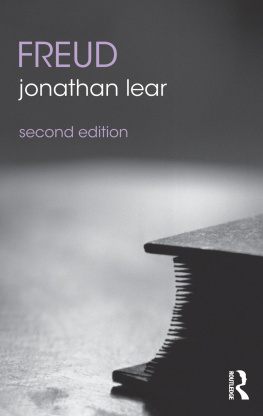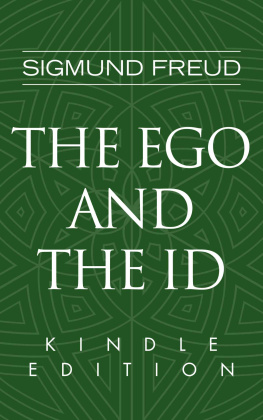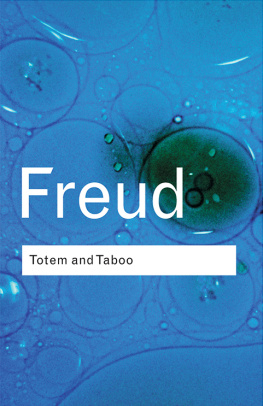SIGMUND FREUDS DISCOVERY OF PSYCHOANALYSIS
Sigmund Freuds Discovery of Psychoanalysis explores links between Freuds development of his thinking and theory and his personal emotional journey. It follows his early career as a medical student, researcher and neurologist, and then as a psychotherapist, to focus on the critical period 18951900. During these years Freud submitted himself to the process that has become known as his self-analysis, and developed the core of his psychoanalytic theory. Drawing on Freuds letters to his friend and confidant Wilhelm Fliess, and on selected psychoanalytic writings, in particular his dream of Irmas injection, Paul Schimmel formulates psychoanalytic dimensions to the biographical facts of Freuds life.
In 1900 Freud wrote that he was not a thinker but a conquistador. In reality he was both, and was engaged in a lifelong emotional struggle to bring these contradictory sides of his personality into relationship. His psychoanalytic discoveries are conceptualized in the context of his need to achieve integration within his psyche, and in particular to forge a more creative collaboration between conquistador and thinker.
Sigmund Freuds Discovery of Psychoanalysis will be of interest to psychoanalysts, psychoanalytic psychotherapists, academics and teachers of psychoanalysis, and to all serious students of the mind.
Paul Schimmel is a psychoanalyst, psychiatrist and writer. He is a member of the Australian Psychoanalytical Society, and has a private psychoanalytic practice in Sydney.
SIGMUND FREUDS
DISCOVERY OF
PSYCHOANALYSIS
Conquistador and thinker
Paul Schimmel

First published 2014
by Routledge
27 Church Road, Hove, East Sussex BN3 2FA
Simultaneously published in the USA and Canada
by Routledge
711 Third Avenue, New York, NY 10017
Routledge is an imprint of the Taylor & Francis Group, an informa business
2014 Paul Schimmel
The right of Paul Schimmel to be identified as author of this work has been asserted by him in accordance with sections 77 and 78 of the Copyright, Designs and Patents Act 1988.
All rights reserved. No part of this book may be reprinted or reproduced or utilised in any form or by any electronic, mechanical, or other means, now known or hereafter invented, including photocopying and recording, or in any information storage or retrieval system, without permission in writing from the publishers.
Trademark notice: Product or corporate names may be trademarks or registered trademarks, and are used only for identification and explanation without intent to infringe.
British Library Cataloguing in Publication Data
A catalogue record for this book is available from the British Library
Library of Congress Cataloging in Publication Data
Schimmel, Paul.
Sigmund Freud's discovery of psychoanalysis : conquistador and thinker /
Paul Schimmel.
pages cm
Includes bibliographical references and index.
1. Freud, Sigmund, 1856-1939. 2. PsychoanalysisHistory. I. Title.
BF109.F74S3735 2014
150.19'52092dc23 2013011792
ISBN: 978-0-415-63554-7 (hbk)
ISBN: 978-0-415-63555-4 (pbk)
ISBN: 978-1-315-88677-0 (ebk)
Man can embody truth but he cannot know it.
WB Yeats
Like a long-legged fly upon the stream
His mind moves upon silence.
WB Yeats
CONTENTS
I would like to thank Professor Robert Hinshelwood for generously offering to review an initial manuscript of this book, for his astute critique, and for pointing out where more work was required.
The main person to be acknowledged is Sigmund Freud himself. Freud is one of those individuals who generates myths and about whom everyone, whatever their knowledge of the man, seems to have an opinion. It is Freuds extensive documentation of his developing theories and his dreams in the scientific writings, and of his personal life in the letters and other writings, that makes it possible for us retain a sense of the man within the myth. Freuds recording of his dreams in The interpretation of dreams seems to me an act of courage and generosity.
Because he left so much I have attempted, as far as possible, to listen to Freuds own voice in order to arrive at an understanding, and have relied on his writings as my primary source. Of secondary sources, I found Didier Anzieus monumental work of scholarship, Freuds self-analysis, particularly valuable.
Wherever I am aware of taking or adapting an idea from another author this has been acknowledged with a reference. All texts consulted in writing this book are listed in the bibliographies. The Freud literature however is vast, and it would seem likely that some ideas developed in this study have been put forward by others in works of which I am not aware.
My special thanks to the New Zealand poet, Michael Harlow, for permission to reprint Crossing the Alps (from Vlamincks tie. Auckland University Press and Oxford University Press: 1985).
Quotations from In Memory of Sigmund Freud, copyright 1940 by W.H. Auden, renewed, reprinted by permission of Curtis Brown Ltd. For Letter to Iceland, W.H. Auden and Louis MacNeice.
USA permission: quotations from In Memory of Sigmund Freud, copyright 1940 and renewed 1968 by W. H. Auden, from Collected poems of W.H. Auden by W.H. Auden, by permission of Random House, Inc. Any third party use of this material, outside of this publication, is prohibited. Interested parties must apply directly to Random House, Inc. for permission.
Excerpts from volumes I, II, III, IV and V, VII, X, XI, XIII, XIV, XVI, XVII, XVIII, XIX, XX, XXIII of The standard edition of the complete psychological works of Sigmund Freud translated and edited by James Strachey, and published by the Hogarth Press, reprinted by permission of The Random House Group Limited. My particular thanks to Sarah McMahon of Random House for help with organizing these permissions.
USA permission for excerpts from volumes I, II, III, IV and V, VII, X, XIV, XVII, XXIII of The standard edition of the complete psychological works of Sigmund Freud translated and edited by James Strachey, copyright 1959 Sigmund Freud, reprinted by permission of Basic Books, a member of the Perseus Books Group.
USA permission for excerpts from volumes XI, XIII, XVI, XVIII, XIX, XX, XXIII of The standard edition of the complete psychological works of Sigmund Freud translated and edited by James Strachey, by permission of WW Norton & Company.
Electronic rights for excerpts reprinted from The standard edition of the complete psychological works of Sigmund Freud, by permission of The Marsh Agency Ltd on behalf of Sigmund Freud Copyrights.
Excerpts reprinted by permission of the publisher, and also by permission of J.M. Masson, from The complete letters of Sigmund Freud to Wilhelm Fleiss, 1887 1904, translated and edited by Jeffrey Moussaieff Masson, Cambridge, Mass.: The Belknap Press of Harvard University Press, Freud Correspondence Copyright 1985 and under the Bern Convention by Sigmund Freud Copyrights, copyright 1985 J. M. Masson for translation and editorial matter.
Electronic rights for excerpts reprinted from The complete letters from Sigmund Freud to Wilhelm Fleiss 18871904, by permission of The Marsh Agency Ltd on behalf of Sigmund Freud Copyrights.
Vienna, 19 Berggasse. Freud, wired
at work on his Project, pacing into
the night. A house of complete silence;
only, his own nerves electric hum.
Now, past midnight, the 6th of May
Next page

